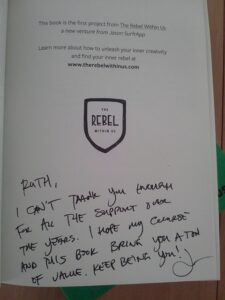
I’ve known Jason SurfrApp since he was wearing t-shirts professionally through IWearYourShirt. He was the person who inspired me to create Sponsor A Law Kid to offset the cost of law school. He has since gone on to auction off his last name (twice) and become a maven in the marketing world who seems to be able to get sponsorship for everything. This week, Jason published his first book, Creativity For Sale, where he shares his story and how to turn your passion into profit. He was kind enough to field some questions from me.
Why Did You Write This Book – Besides To Make Money?
During the first few months of 2013 I was feeling pretty down. The business I had built and killed myself to make successful since 2009 (IWearYourShirt) wasn’t doing as well anymore and I was starting to get burnt out. I attended a life-changing conference – and I never say stuff like that- in Fargo, ND in May 2013. At that event I listened to some amazing speakers and I was also a speaker. Instead of my normal “success” talk about IWearYourShirt, I opened up and shared that things weren’t going well. That was the first time I was ever publicly vulnerable, and while it was incredibly uncomfortable and difficult it felt like I had lifted a 600-pound gorilla off my back. When I returned home from the event I had lunch with a friend. While shoving a burrito in my face my friend convinced me that I should write a book about my entrepreneurial journey.

What’s The One Lesson You Want Readers To Take From Your Book?
I want people to give themselves permission to follow their passions and try to make money doing what they love. It won’t be easy, but the best things in life are earned.
It Took A Lot Of Guts To Start A Business, Auction Off Your Last Name, And To Write This Book. How Do You Combat Fear When It Creeps Into Your Professional Life?
It may not seem like it, but I do a lot of planning, thinking, and strategy before I launch any project. In that pre-launch time I weigh all my options and think about the potential risks and fears I have. The majority of them have to do with people not supporting the projects financially or someone saying negative comments about it. The negative comments are an easy fear to overcome: People will say negative things and 99% of the time it’s because those people are unhappy, not because the project is bad. When thinking about someone not supporting a project financially, I just ask myself “what’s the worst that will happen?”
What Words Of Wisdom Do You Have For Anyone Who Wants To Do A Sponsored Event (Or Life)?
#1 You don’t get what you don’t ask for.
#2 You will hear “No’s” and that’s perfectly okay. Remember that people aren’t saying “No” because of you, they’re saying “No” because the project doesn’t align with their goals, they don’t have the budget, it’s bad timing, etc.

How Do You Define “Success?â€
Success used to look like $1,000,000 in the bank, driving a Ferrari, and retiring by age 35. I realized that I don’t need $1M in the bank to be happy and live a fulfilled life. I took time last year to look at the things that really mattered to me and in doing so realized that I didn’t need anywhere near $1M in the bank to meet those needs. My previous measures of success were completely driven by societal pressures and I’m ignoring those now. Instead, I’m focusing on having financial freedom (no debt and enough money to not have to worry about making my mortgage each month), having the ability to work from anywhere in the world, and being able to work on whatever projects I want. The definition of “success” will evolve continuously for me and I’m cool with that.
What’s The Meaning Of Life?
Doing what you love and living a life of intention. Don’t let the fears of other people get in the way of your dreams.
What’s Up Next For You?
I’m super excited for creative professionals, entrepreneurs, business owners, etc., to grab a copy of my new book Creativity For Sale. I’ll be on the road quite a bit for the rest of this year promoting the book through public speaking. I’m also launching a new project with the book called The Rebel Within Us where I’ll be helping people unleash their inner rebel and learn how to make money doing what they love through various paid products and resources.
I’m really excited to read Jason’s book and hopefully his speaking tour will bring him through Phoenix. He’s a fun guy. You should meet him in person if you have the chance. And check out his book – my law firm sponsored page 162!



